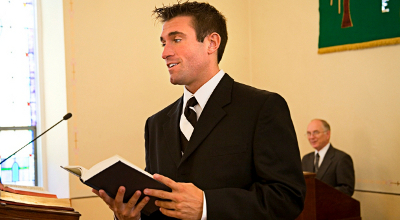Do you sometimes fall into these ways, or do you encourage God's people to love His Word more and to make full use of it during the week?

Page 178 of 209

Do you sometimes fall into these ways, or do you encourage God's people to love His Word more and to make full use of it during the week?

How's your passion level for Christ these days? Do you need a fresh spark of enthusiasm?

Joseph's ability as a leader is a model for everyone in the ministry. Here are some of his greatest qualities.

Pope Francis says the church has locked itself up in small-minded rules. Have you moved to the center of what Jesus says is really important in life, or are you stuck in the margins?

What value do you see in physical training, especially as it helps you in your spiritual training?

The church is losing credibility because of the lack of practiced discipline. Find out why that is happening.

Find out why some churches and Christian ministries are not prepared for and underestimate the dangers of the new media.

Pastors sometimes need a reality check, too. Here are some things to remember in your every day life as the head of a flock.

An exclusive interview with Chris Hodges reveals a healthy model for restoring ministers—in this case, former Louisiana pastor Dino Rizzo.

Lust is one of Satan's strongest tools against believers. Here's how to build a firewall for your own good.

The content of emails can come back to haunt anyone. Find out why that's especially true for leaders, a group that includes pastors.

Will the United States suffer a full collapse or a huge shakeup in the near future? If it does, will the church be ready?
 A guide for healthy ministry that will help you to remain real and stay accountable
A guide for healthy ministry that will help you to remain real and stay accountable
My heart broke recently as I watched Pastor Ron Carpenter pour out his heart in his weekend message to his congregation. It was a gut-wrenching experience to hear him share with his church the devastating pain his family has endured during the past 10 years and the incredibly difficult future they now face.
I have never met Ron, but my heart and prayers go out to him. I can’t imagine the anguish of sharing the most awful parts of your private life with hundreds of friends and thousands of strangers. This is a time when we put aside theological differences and preconceptions and pray for a man and a family wrecked by the effects of evil.
Seeing Ron expose his heart and soul to his congregation reminded me of several hard-earned lessons from a lifetime of ministry. These lessons are not about Ron Carpenter or Redemption World Outreach Center. I don’t know anything about Ron, his leadership or the structure of his church. Rather, these are lessons learned from 31 years of vocational ministry, from growing up a third-generation pastor’s kid, from watching 30 members of my extended family in active ministry, and from interacting with hundreds of pastors and leaders across the country.
1. Integrity: Am I real? “Integrity” means “being complete or undivided.” Though all pastors stress the importance of integrity, there is a temptation in ministry for a leader to create an onstage image that is different from who he really is. Very few set out to be two different people; it just happens. This is an incredibly dangerous road to go down.
I’ve seen a couple of iterations of this tendency to project an idealized leader for public consumption. In one version, the leader creates a more polished image of himself. He is incredibly happy, has a well-adjusted family and lives a super-desirable lifestyle. He faces challenges and temptations, but he always overcomes in the end. The implied message is that if his followers will emulate his faith, they too can live a charmed life.
Social media has made this temptation into an art. The leader tweets about his “smokin’ hot” wife, his incredible kids and the constant spiritual breakthroughs he achieves. He creates a life everyone wishes he had. In reality, it’s a life the leader wishes he had as well.
In the second version, the leader creates a more raw version of himself. He talks about a crisis of faith he never really had. He embellishes college stories to better match those of his congregation. He exaggerates family challenges to sound more like the real-life stuff his followers deal with every day.
This version of the leader requires that he hide a relatively innocent youth as well as the luxuries ministry success has afforded him. He must feign humility even when he doesn’t feel humble. The message to the church is, “You can follow me because I’m just like you.”
Authentic ministry requires one version of you. You may be a little more refined in public, but people who know you should be able to say you’re the same guy on stage as you are at the ballgame.
2. Transparency: Am I human? “Transparency” means “able to be seen through.” Integrity says “what you see is what you get” while transparency says “what you see is a normal human being.”
Transparent, human leaders get tired, discouraged and frustrated. They’re not always sure where to go or what to do next. They don’t have fairy-tale marriages, and their kids sometimes (all the time) exasperate them. They worry about their finances and their health and how they’re going to care for their parents when the time comes. They have been called into a position of public ministry, but they’re just ordinary humans.
Being transparent about our humanity means admitting we sometimes struggle in our marriage, feel clueless as parents and wrestle with balancing our faith with our doubt. Transparency says the human condition is universal.
3. Vulnerability: Am I broken? “Vulnerable” means “capable of being wounded or hurt.” We are creating a version of Christianity that says the true believer, if he follows the right plan or practices the right disciplines, will inch closer to spiritual perfection. The goal is to be a mature believer who almost never sins and who, if he does, commits just minor offenses such as forgetting to leave a tip or sighing out loud in line at Walmart.
Leading the parade is the pastor who proclaims he has overcome the sin he used to struggle with and is now nearing heavenly nirvana. He might have been saved by grace, but he has worked his way to true holiness.
This in spite of all the biblical evidence to the contrary. David seduces Bathsheba and murders Uriah long after writing Psalm 23. Peter succumbs to hypocrisy, refusing to eat with Gentiles, years after leading Cornelius to faith.
The healthy leader says with integrity, “There is only one version of me”; with transparency, “I am only human”; and with vulnerability, “I have broken parts in my life. I am growing spiritually, but like you, I struggle with sin every day.”
4. Accountability: Am I under authority? “Accountable” means “responsible, answerable.” I have not seen a leader fail or crumble who has a small circle of friends to whom he is accountable—friends who know his family, his background, his sins and his failures; friends who call him out on his stuff and have permission to remove him from his position of leadership if necessary.
An accountability group works only if the leader is honest with those in the group. If he isn’t real, transparent and vulnerable with them, they are of little value. If, however, this is a group of peers he trusts with his life, they will likely catch him before his world comes crashing down.
A danger here is the illusion of accountability. A pastor will point to a board of overseers, deacons or elders as his accountability group, or he may say denominational oversight provides his safeguard. Normally, however, the accountability at this level is surface. The pastor rarely shares his intimate challenges and sins with an appointed board. They have the power to discipline or remove, but they don’t live in the daily details.
Board accountability is like floodgates on a dam; it is the last line of defense. True accountability happens in a smaller circle at a deeper level.
Living It Out
A final note on living out these four ideas: Not everything is appropriate to share at every level. It is as unhealthy to dump your garbage on your neighbor’s lawn as it is to hide it in your basement. Though a healthy leader has integrity, transparency, vulnerability and accountability at every level, he also understands what should be revealed at every level of leadership.
The leader’s small circle of friends has open access to his life. Nothing is off limits. They help him determine what is appropriate to share at the other levels.
The overseers have access to the general outline but not necessarily the details. The staff has a clear picture of the leader’s life without information that could hurt or embarrass others (for example, the staff leadership team may know the pastor is struggling at home but doesn’t know the specific challenge).
The congregation knows enough to understand the overall picture of the pastor’s life. If a pastor has been real with the congregation and his son is arrested for possessing or dealing drugs, the members won’t be shocked. They knew the pastor was struggling with a family issue; they just didn’t know which family member or the specific issue.
This article is not aimed at any pastor nor is it a blueprint for growing a church. It is a guide for healthy ministry that will help you project a true image of who you are to those around you. When you are honest with yourself and others, you will be more likely to succeed.?
Geoff Surratt is the director of Exponential, an organization whose mission is accelerating the multiplication of healthy, reproducing churches. He is the co-author of The Multi-Site Church Revolution.
 A repentant heart is essential for a recovering pastor. But the hearts of those involved in the restoration process must be right as well.
A repentant heart is essential for a recovering pastor. But the hearts of those involved in the restoration process must be right as well.
Paul said that the attitude overseers should have in the process of restoration is one of meekness (see Gal. 6:1). Leadership failure is a tragedy and a disaster. No one should delight in or be gleeful about a leader’s demise.
The leader’s wife and children will suffer intense shame for the leader’s actions. His name will be a byword for many years. The church will suffer from controversy in the community. The lost will have a reason to blaspheme the Lord’s name. A proud, high-minded, flippant attitude on the part of those doing the restoration is spiritually immature and deadly to the entire process.
Paul said that we should look to ourselves so that we too would not be tempted (see Gal. 6:1). Here are a few attitudes a leader must maintain while overseeing a restoration process:
1. Impartiality. One aspect of meekness is humble fear before God in undertaking church discipline. As Paul wrote to Timothy, “Do not receive an accusation against an elder except from two or three witnesses. Those who are sinning rebuke in the presence of all, that the rest also may fear. I charge you before God and the Lord Jesus Christ and the elect angels that you observe these things without prejudice, doing nothing with partiality” (1 Tim. 5:19-21).
These responsibilities are holy responsibilities. The Father, Christ Jesus and the “elect angels” are overseeing the order and operation of the local church. It is a mistake to allow ourselves to become simply “relational” in our discipline and restoration of leaders. Our love for them does not override our love for Christ’s church or the example we must set in ministry.
Open communication with a congregation about the discipline of a leader is critical. The overseeing body must select interim leadership and begin a search for new leadership if necessary.
2. Vision. Those involved in restoration must maintain a vision of a fully restored leader, marriage and ministry. Though a leader’s influence may be limited by his past, there will be opportunities for him to release his gift first as a layman and perhaps later as a five-fold leader. He must, however, maintain submission to the process so that the future testimony of those restoring him can be one of complete submission and restoration.
Some confuse the terms “forgiveness” and “restoration” with regard to a leader who has experienced a failure. A line must be drawn between forgiveness and restoration. Forgiveness is always instant! However, the Greek word for restoration means “the setting of a broken bone.” We know that restoring a bone requires a cast, a period of immobility and therapy.
Those restoring a leader must prepare themselves to be patient with the fallen leader in his depression, anger, hurt, confusion, misunderstanding and cycles of despair.
What is the end vision for a restoration team? To stand with a leader publicly, testify of his submission to a process and declare that he is fully restored to fellowship, fully functional in his family, and fully released to pursue the call of God on his life.
Larry Stockstill is senior pastor of Bethany World Prayer Center in Baton Rouge, La.
 The world’s hatred for Jesus was theological, not sociological
The world’s hatred for Jesus was theological, not sociological
I talk and write often about the concept of likeability because I believe it can have a tremendous impact on our personal and professional lives. The most difficult feedback I receive goes like this: “OK, what you’re saying sounds nice, but should likeability really be our primary objective? Was Jesus likeable?”
This is an important point for me to address because, though I can see how becoming likeable and becoming like Jesus may seem mutually exclusive, I believe the pillars of likeability I mention in my e-book, Likeability: What We Can Learn from Social Media About Becoming Better Humans, are rooted in Scripture and what it teaches. Each of these 10 pillars has played an integral role in my spiritual development.
I got the idea for the 10 pillars of likeability from the time I’ve spent working with and around social media. The more I learned about social media and the more I coached others to be effective on social media, the more I realized that in their use of the things that make a person “likeable” on social media also make him likeable in real life. The pillars include actions such as choosing to like others first (the way God chose to love us before we loved him), discovering what resources people find valuable, and sharing generously whatever we have with them.
When it comes to social media, I encourage individuals to engage in the conversation, to avoid talking about themselves too much, to celebrate and mourn with others, to know their audience, to be interesting people and to keep their messages short and sweet. Honestly, I think these same tenets make us “likeable” in real life; and I believe there are many ways these attitudes and postures overlap with how Jesus ministered. Jesus’ ministry grew and the crowds flocked to Him not because He was self-serving and arrogant but because He was incredibly likeable. He cared for others deeply, was willing to give until it hurt, and never ceased to be interesting and engaging.
Although Jesus wasn’t always liked, I believe He was always likeable. Here’s why: The world’s hatred for Jesus was theological, not sociological.
There is some overlap between the two, of course, but Jesus always made it clear the former was more important. He never fought battles over purely sociological points unless they were important to His theology. Likewise, Paul did not encourage Christians to be social revolutionaries.
Earthly governments were, after all, part of the temporal economy of God (see Rom. 13:1–7). They were a part of the old world that was passing away, and it was not Paul’s intent for the church to disrupt society or overthrow governments. Rather, he encouraged Christians to be good citizens and exemplary members of their families and society as well as to behave in a manner consistent with the teachings of Christ.
What if becoming more likeable by being exemplary members of family and society is the best way to promote the gospel message?
Jesus Responded With Love
Scripture warns Christians they will be hated by the world (see John 15:19), but notice that the same passage warning Christians of certain hatred also commands them to love one another. In this passage, the stark contrast between the love of Christ and the hatred of the world is the same contrast that should be made between Christians and the world.
Even when Jesus was most hated, He never stopped being likeable. He never stopped being generous with everything He had, engaging others in conversation, celebrating and mourning with others, and liking other people, even those who were most awful to Him. When it came time for His life to end, Jesus continued to be generous and gracious, even with those who were killing Him.
When we are hated by the world and wonder how we should respond, we must look to Jesus as our example. Despite being hated, we must continue to be likeable.?
Justin Lathrop has a dozen years of local church ministry experience and has spent the last several years starting businesses and ministries that partner with pastors and churches to advance the kingdom. He serves as a consultant in the area of strategic relations, working predominantly with the Assemblies of God.

Obviously, there are examples in Scripture of godly single men who served God faithfully. But as a general rule, does God call still call men with the "gift of singleness" to be pastors?

While it may seem like a corporate initiative your church simply doesn't need, there are advantages to an annual report. Here are some of them.

Though there are no clear scriptural guidelines to follow in restoring a fallen pastor, here is a process that can help.

When attempting to lead change in the church, it is vital to keep these ideals in mind. Read and find out what they are.

Do you have a checklist of questions about your sermon before you start preaching? Here are a few suggestions.